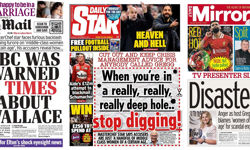There have been many jaw-dropping big stories. The history of Fleet Street and indeed the whole of the British press is littered with great exclusives.
Somehow, however, the big story of 2009, the Telegraph's day-after-day, week-after-week forensic exposé of MPs’ spending habits may well have resonance and implications long after the ink has faded and the pages yellowed.
A print-led exclusive
Why? First, because it was essentially a newspaper story, on real paper printed with real ink. It set the world of politics ablaze in what everyone seemed to be saying was an old fashioned medium that was rapidly dying in face of falling readership and diminished ad revenue.
Perhaps surprisingly for a media group that has been one of the standard bearers of multi platform journalism, tried and trusted print proved to be an ideal way to run the story and provide acres of gripping detail that some say is best left to the web these days.
In fact it served to remind us of the majesty of print – that peculiar phenomenon that somehow makes information more believable because it is set out on paper as a permanent record, to be perused and re-read at will, to be torn out and waved during a speech or even in the middle of an argument in the pub. Somehow the web and video have yet to achieve similar stature or serendipity. They are not as solid, dependable and as difficult to tinker with as good old newsprint cuts.
Call me old fashioned, but try passing the DVD player, laptop or mobile around the bar, the TV studio or for that matter the House of Commons. The Telegraph investigation reminded us that they are nowhere near as effective in making a point.
Time may change that of course but newsprint worked wonders for sales of the Telegraph and, better still for this so-called dying industry, it has helped to breathe new life back into the whole of the press just when it was most needed.
Anyone associated with newspapers could bathe in the reflected glory of a job well done. In retrospect, it was a bargain-basement buy-up that did precisely one of those essential tasks that journalism is supposed to complete: it afflicted the comfortable and cosy, all-expenses-paid lifestyle of Members of Parliament.
Their lives will never be the same again but neither will ours now that we have been comforted with the knowledge that MPs will have to return to living in the real world.
The issues were extremely serious and devastating for the reputation of the body politic and disastrous for several individual reputations. What's more, some of the tales of daring-do on the duck pond or moat, let alone on the flip side of the housing market, were titillating and simply hilarious even by the standards of old Fleet Street.
Public interest
How many times do we hear those undone by the papers trying to undermine the freedom of the media by muddying the argument with claims about sensationalism and that the public interest is not the same as what interests the public?
Well, this was a story that required nothing other than the facts to make it sensational. Here was a case of understandable and legitimate interest on the part of the public. People were entitled to marvel and sometimes laugh or cry at the sheer scale and range of expenses claims and “the system” or “the rules at the time” that were used to legitimise them.
Yes, there were some feeble attempts to pass off the story as the product of jealousy or as nothing compared to misdemeanours in various parts of the private sector, especially the media. But they did not last long.
The undoubted “public interest”, in both senses, quickly made any notion of investigating the source of the leak of what was without doubt private data, a no-go area. When the laughter died down, public anger would have risen to fever pitch.
Freedom of Information
A further valuable implication of the story was that it served to explain the vagaries of the Freedom of Information Act to the public who either never properly understood it or were sceptical of its efficacy.
The sorry saga has demonstrated just how valuable the Act can be and just how powerful a tool it can be. Moreover, and perhaps most important, it showed politicians that the courts and the court of public opinion would not stand for them trying to exempt themselves from its measures.
The Government should now start believing in the legislation for which it should claim credit. The genie is out of the bottle and ministers cannot and should not try to put it back. There must be no more attempts to water down the Act or make it more difficult and more expensive for journalists or the public to use.
The expenses scandal has demonstrated the benefits of openness. It has been painful for politics in the short term but it will eventually be seen to be the key to engaging the public.
No less than Sir Harold Evans summed up the difference between the country of his birth and his adopted USA as being one conditioned to limited access and the other demanding openness.
As the Telegraph said at the height of its campaign: "It is an historic moment. We believe that our expenses files will help change the face of British politics for the better."
Text book handling
It is worth remembering how they did it.
A dedicated team of 25 journalists worked for weeks, away from the main Telegraph newsroom, analysing the data. Revelations led TV and radio news bulletins, rival newspapers were left scrambling to follow the string of exclusives culminating in a 68-page supplement, listing the expenses of all 646 MPs.
Combined extra sales of the daily and Sunday Telegraphs totalled more than one million copies over a month. The story added 2.3% to its average daily circulation according to ABC.
An executive from a rival newspaper said: "The Telegraph has had between £5m to £6m worth of publicity out of this. It has been the best investment of modern times."
Murdoch MacLennan, chief executive of Telegraph Media Group said: “It just shows what a great news story and good journalism can do for newspaper sales."
That is where the internal lessons lie for the industry. As Ray Snoddy told readers in the last edition of InPublishing, paid-for newspapers earned £155 a year from readers in sales and ad revenues while their websites brought in just £5 a reader.
Here was a truly great story that had profound implications for our way of life. MPs are supposed to show us how to behave but they need to earn our respect as well as their salaries and expenses. The Telegraph revelations will keep them on best behaviour for some time to come.
It showed that a story with which large swathes of the public - readers and potential readers – can identify will help build and sustain sales. It was a classic example that content is king and a valuable reminder of what is at the heart of the industry.
Content, content, content
Advertising revenue is of course vital but the way to attract it is by attention grabbing headlines and carefully researched information that the public wants and needs to know. At a time when some soothsayers were predicting the loss of advertising for ever, some of the biggest advertisers are now showing renewed faith in “old media”.
Talking to reporters and other journalists, they seem to have an extra spring in their steps. Here was an eye-popping example of how investment in journalistic time, numbers and skill can still bring huge commercial rewards. Others please note MacLennan’s recognition of the achievement.
Journalists seemed to have been inspired by the story and warmed by public approval for a change. Watch out for renewed endeavour in the search for big exclusives. There is a future after all.
That future will not be in print alone. This story grew legs on the web, on TV and across every new digital platform, but it did provide an essential reminder of the power of the press as opposed to any other sector of the media.
Again Harry Evans expresses the reality. Writing in his brilliant, equally inspiring memoir My Paper Chase, the legendary editor says that worrying about newspapers and their staffs obscures the fantastic utilities of the web.
But he concludes that it is not whether internet journalism will be dominant but whether it will maintain the quality of the best print journalism.
“In the end, it is not the delivery system that counts. It is what it delivers,” he says.
That was the point about the Telegraph’s campaign. It was dogged, detailed inquiry transformed into readable, news pages that made a difference. Stuffing file after file into cyberspace may not have had quite the same impact.
Personally, in my role as defender of the reputation of the media and its importance to democracy, I had a glorious summer of public understanding and sometimes even applause. I doubt that will last but all I need to quote as a reminder is: “MPs’ expenses and the Telegraph.”
And that simply cannot be redacted.










